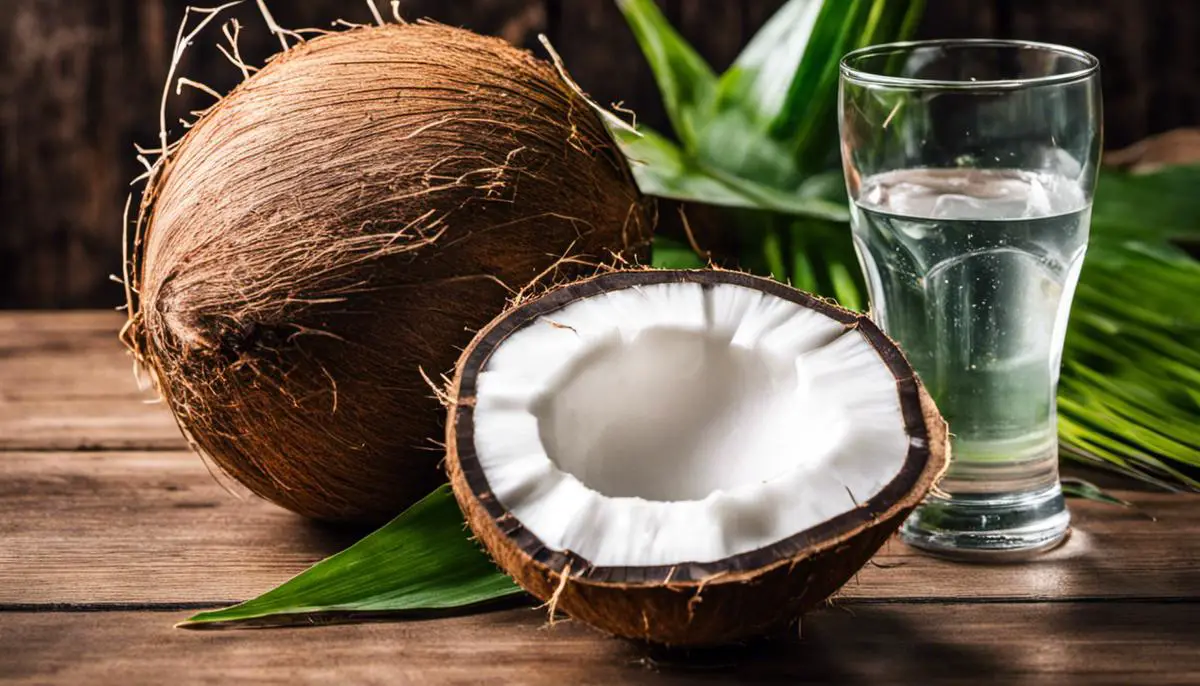Table of Contents
Coconut water has emerged as a popular health drink, lauded for its hydration properties, rich nutritional content, and potential weight loss benefits. Offering more than just hydration, coconut water’s unique blend of vitamins, minerals, and electrolytes contributes to various health benefits. This includes aid in weight management, making it an attractive supplement to employ within a balanced diet. Taking a detailed journey through its properties, this discourse delves into understanding the nutritional profile of coconut water, scrutinizing how these individual components assist in weight loss, and finally, discerning the right way to integrate this tropical beverage in your diet.
Understanding the Nutritional Profile of Coconut Water
Coconut Water and Weight Loss
Coconut water has been gaining popularity as a healthy beverage due to its high levels of nutrients and vitamins. For people focusing on weight loss, the calorie content of what they consume is of paramount importance. A cup of coconut water contains about 46 calories. While this is not a negligible number, it is relatively low compared to many sugary drinks like soda and artificial fruit juices.
The Nutritional Profile of Coconut Water
One of the notable aspects of the nutritional profile of coconut water is the presence of electrolytes. Electrolytes are minerals that conduct electricity when dissolved in water and are essential for maintaining the body’s pH balance and ensuring proper nerve and muscle function. Coconut water is rich in important electrolytes like potassium, magnesium, sodium and calcium. A typical serving of coconut water can consist around 600 mg of potassium, 60 mg of magnesium, 252 mg of sodium and 58 mg of calcium.
Hydrating and Replenishing Electrolytes
Herewith, a primary benefit of consuming coconut water is the fact that it is hydrating and helps replenish electrolytes. This makes it a preferable choice for those of you engaging in physical activities. Replacing fluids lost through sweat and helping muscles recover is crucial in maintaining performance and avoiding dehydration, which might otherwise lead to feelings of hungers.
Dietary Fiber for Weight Loss
Another component in the nutritional profile of the coconut water that is central to weight loss is the dietary fiber it contains. A cup of coconut water can provide you with about 3 grams of fiber. Fiber helps regulate the digestive system, acting as a bulk-forming laxative. This means it aids in promoting a feeling of fullness which can prevent overeating – a common issue for many dieters.
Sugar Content and Considerations
One should consider, though, that coconut water does contain sugar. About 6 grams per cup. While this is natural sugar and thus metabolizes slower than the processed types found in many snacks and drinks, it is still sugar. You should take into account your total daily intake, particularly if following a low-carb diet or monitoring blood sugar levels.
Essential Vitamins in Coconut Water
Additionally, coconut water is a good source of several essential vitamins. It contains vitamin C, which is important for immunity, as well as several B-vitamins which aid in energy production. However, it’s important to remember that while coconut water is a healthy beverage option, it should be consumed as part of an overall balanced diet, and not as a sole source of nutrition.
Coconut Water and Weight Loss
Lastly, it must be clarified that despite the innumerable health benefits, coconut water is not a magic potion for weight loss. It can support weight loss when consumed as part of a balanced diet and regular physical activity, by acting as a lower caloric alternative to higher sugar drinks, and helping to keep you hydrating and satisfied.
In Closing
On the whole, coconut water, while supportive of weight loss and healthy eating habits, needs to be blended sensibly into your overall diet and lifestyle keeping in mind your specific nutritional needs. As with all other natural foods, it’s most beneficial when consumed moderately.

How Coconut Water Aids in Weight Loss
Enhancing Metabolism with Coconut Water
In relation to weight loss, one of the significant benefits of coconut water is its ability to stimulate metabolism. In a broad sense, metabolism refers to the process wherein the human body transforms what we consume into energy. This process is vital when trying to lose extra weight, as an accelerated metabolic rate helps burn calories more swiftly. Coconut water is loaded with important minerals and bioactive enzymes such as acid phosphatase, catalase, dehydrogenase, diastase, peroxidase, and RNA-polymerases, all of which aid in digestion and metabolism. Being a low-calorie beverage, its consumption can aid in curbing your appetite, helping you eat less and supporting your weight loss goals.
Satiety and Coconut Water
Another factor that plays a key role in weight loss is satiety, which is a feeling of fullness that lasts for long periods after a meal. Coconut water is rich in dietary fiber that has a significant effect on reducing hunger. The fiber in coconut water also helps control blood sugar levels, which in turn reduces cravings for unhealthy, calorie-laden snacks.
Coconut Water and Fat Burning
The fat-burning properties of coconut water are another factor that contributes to its effectiveness for weight loss. Coconut water contains a bioactive enzyme called lipase, which catalyzes the breakdown of fat. This process, known as lipolysis, converts fat into fatty acids and glycerol, providing the body with a source of energy. The breakdown of fat also results in the reduction of body weight.
Detoxification and Coconut Water
Detoxification is a key element in achieving and maintaining a healthy weight. Coconut water, loaded with electrolytes and naturally occurring bioactive enzymes, can aid in the detoxification process. These enzymes help maintain an optimal functioning of the liver, which is the body’s primary detoxifying organ. Coconut water also helps flush out toxins from the body, ultimately promoting weight loss.
Coconut Water and Weight Loss: Separating Fact from Fiction
A lot of myths circulate around coconut water and its connection with weight loss. It’s often believed that coconut water is a magical drink that guarantees immediate weight loss. It’s important to note, though, that while coconut water does possess certain properties that aid in weight loss, it functions best when integrated into a healthy diet and regular exercise regimen. There’s also a common assumption that coconut water is a low-calorie substitute for water. In reality, though coconut water is generally lower in calories compared to other drinks, it does carry more calories than plain water – about 46 calories per cup – which makes moderation key when consuming it.
The idea that all brands of coconut water aid in weight loss is yet another misconception. There is a significant difference in the quality of coconut water across brands. Certain brands may add sugars to their product, countering the potential weight loss benefits. It is, therefore, crucial to read the product labels carefully before purchasing.

The Right Way to Incorporate Coconut Water in a Diet
Getting to Know Coconut Water
Often hailed as the “dew from the heavens” by Hawaiians, coconut water is a natural beverage that boasts a wealth of nutrients and electrolytes. This clear liquid that’s extracted from young green coconuts is notable for its low-calorie count, high potassium content, and the presence of bio-active enzymes. Because of these properties, it’s a preferred drink of health-conscious individuals and athletes.
More than that, coconut water is laden with fiber, vitamin C, and several vital minerals. It also offers a decent amount of protein and is a source of magnesium, which is known to help lower insulin resistance and blood sugar levels in both animals and humans. These factors make it beneficial in weight management and contribute to its popularity.
Integrating Coconut Water into Your Diet for Weight Loss
To use coconut water for weight loss, it is advisable to consume it unsweetened and fresh as opposed to the bottled variants that often contain added sugars. Incorporating coconut water into a balanced diet can augment weight loss efforts due to its low calories and high fiber content, which increases satiety and helps control appetite.
Drinking a glass of coconut water in the morning can kick-start your metabolism for the day. It’s an ideal post-workout drink due to its high potassium content, which aids in maintaining fluid balance and replacing lost electrolytes during strenuous exercises.
Ideal Time and Quantity of Intake
The best time to consume coconut water for weight loss varies. Some experts suggest drinking it early in the morning on an empty stomach to boost metabolism while others recommend it as an afternoon snack to curb sweet cravings and control hunger.
As for the quantity, drinking too much of anything, including coconut water, can lead to weight gain due to an increase in calorie intake. Therefore, it is advisable to limit consumption to a couple of glasses per day (around 16-24 ounces).
Potential Adverse Effects of Excessive Consumption
While a moderate amount of coconut water is considered safe, overconsumption may lead to electrolyte imbalance and kidney problems due to its high potassium levels. It may also increase the level of blood sugar or calories when drunk excessively, so individuals with diabetes or those trying to lose weight need to consume it judiciously.
Balancing Coconut Water Intake with Diet and Exercise
While coconut water can complement a weight loss plan, it’s important to remember that it’s not a magic solution for shedding pounds. Consuming it without controlling overall food intake and neglecting regular physical exercise won’t yield sizable results.
A combination of a well-balanced diet with a good mix of proteins, carbohydrates, and healthy fats, along with regular exercise, is fundamental for meaningful and long-lasting weight loss results. Incorporate coconut water into this regime for hydration instead of high-calorie or sugary drinks.

While it is crucial to understand that no magic bullet or single product can promise immediate or sustainable weight loss, coconut water is a beneficial accessory to a comprehensive health regimen. It provides valuable nutrients, aids digestion, boosts metabolism, and can contribute to a feeling of fullness – all factors pertinent to weight management. However, just as with any food or drink, moderation and balance are key. Combining responsible consumption of coconut water, balanced dietary choices, and regular exercise is the best approach to healthy, sustainable weight loss. See coconut water for what it is: a natural, nutritious supplement that’s a part of a larger, healthier lifestyle.

